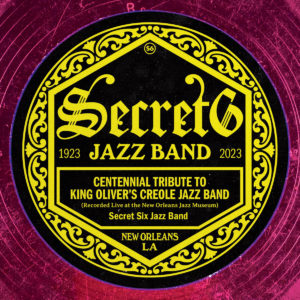The Secret Six Jazz Band is at it again. Barely ten months after the release of their fourth album, Chicken You Can Roost Behind the Moon, clearly the most prolific neo-trad band in New Orleans is back with a new one, recorded live at the New Orleans Jazz Museum on April 6, 2023. Centennial Tribute To King Oliver’s Creole Jazz Band looks back on those groundbreaking early jazz records, which Oliver recorded in April 1923 in Richmond, Indiana.
Oliver’s band for the record featured his protégé Louis Armstrong on second cornet, Warren “Baby” Dodds on drums, his brother Johnny on clarinet, Lil Hardin (she married Armstrong less than a year later) on piano, Honoré Dutrey on trombone and Bill Johnson on banjo and double bass.
The biggest difference between the original recording and this one is obviously the pristine sound, but another significant distinction is the presence of Defne “Dizzy” Incirlioglu on washboard rather than a drum set. While “Baby” Dodds is credited with revolutionizing, if not inventing the modern drum kit, Incirlioglu may very well end up with a similar stature for her stellar work.
The rest of the musicians mirror the lineup on the original records with Hunter Burgamy on guitar and James McClaskey on banjo. The two bring a solid rhythmic foundation to the proceedings along with bassist John Joyce. The horn players are Haruka Kikuchi on trombone, Craig Flory on clarinet and Zach Lange and Nathan Wolman on trumpets.
The songs include numbers composed by Armstrong, Jelly Roll Morton, Oliver and others. Standout tracks include the Joe Oliver/Alphonse Picou tune, “Alligator Hop” and the arguably the most famous Armstrong/Oliver composition, “Dippermouth Blues.”
On the former, Flory gets to show off his chops on a tune that must have blown minds when it was initially recorded simply for its rapid tempo. On the latter, which closes the collection, the trumpets take mirrored solos before McClaskey chimes in with a single note run.
The original recordings by the Creole Jazz Band demonstrated the power of collective improvisation to a world of listeners unaccustomed to such playing. These modern-day musicians also have that power in droves.




